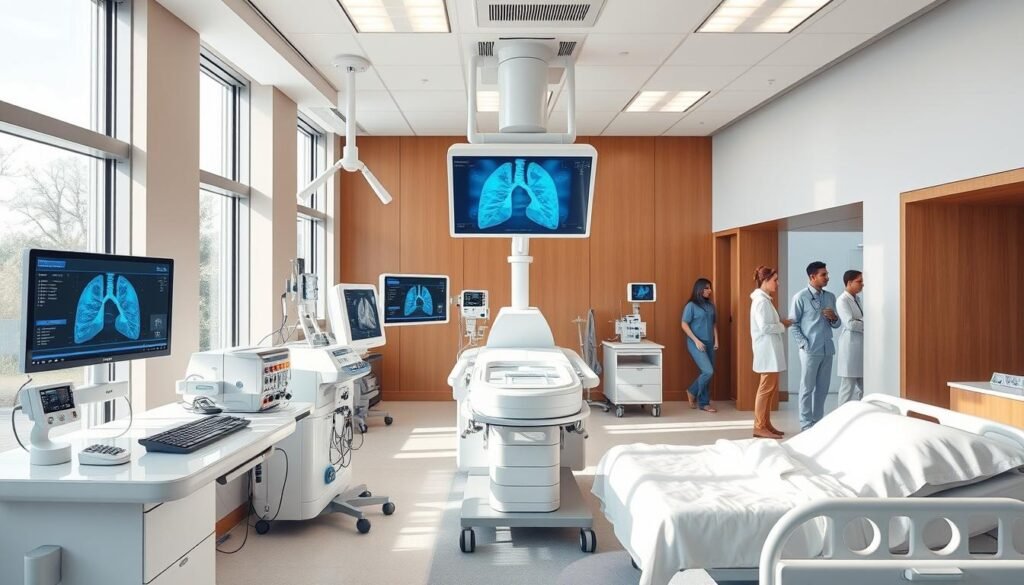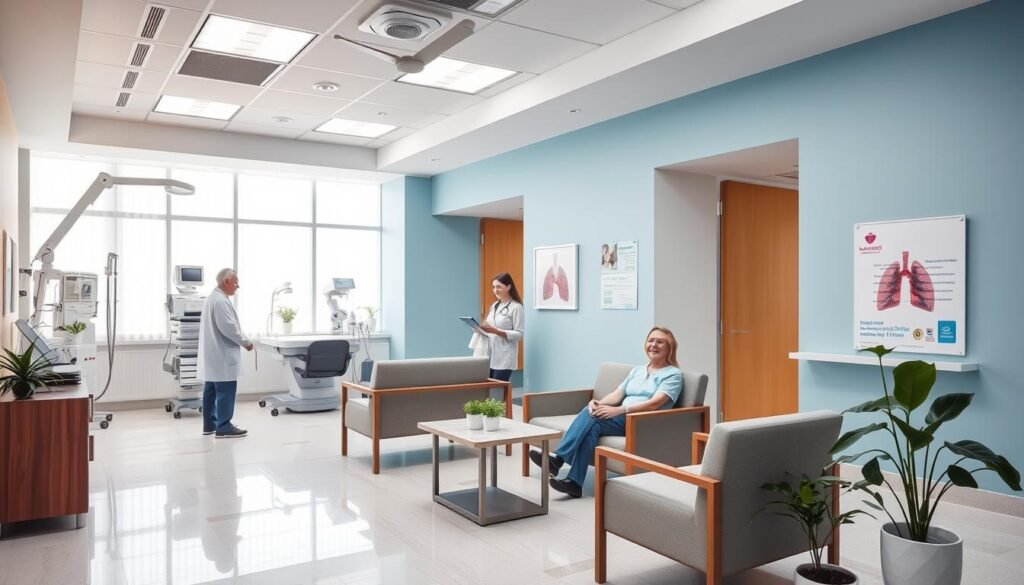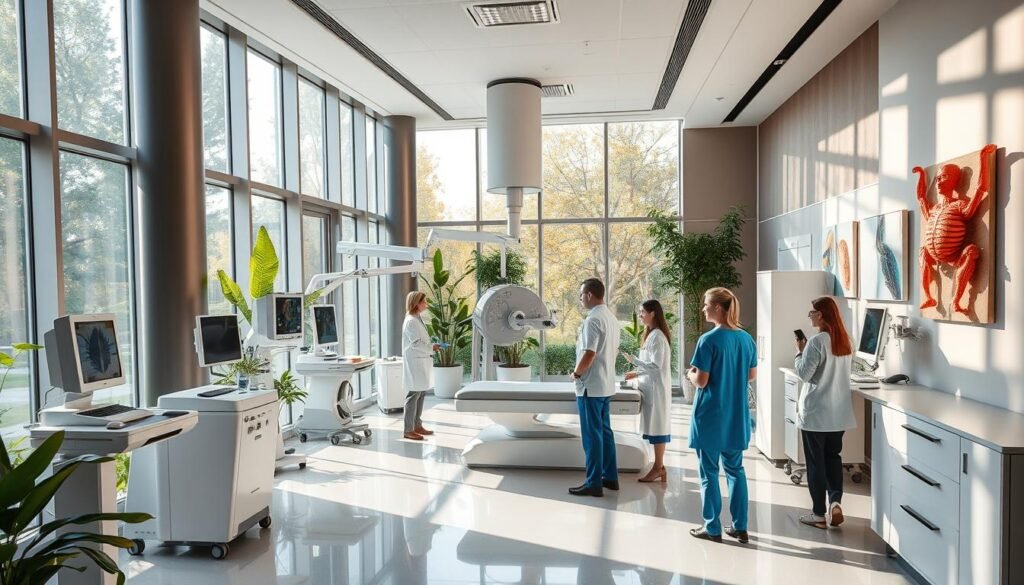Lung cancer ranks as the third most common cancer in the United States. It’s also the top cause of cancer-related deaths. Every year, nearly 2.9% of all visits to hospitals for lung cancer treatment are to top-tier facilities. Places like Moffitt Cancer Center and Cleveland Clinic Main Campus are included. This fact highlights how crucial these specialized hospitals are for better patient outcomes and survival rates.
Choosing the best hospital for treating lung cancer makes a huge difference in the patient’s experience. The leading cancer hospitals offer not only advanced treatments but also access to new clinical trials. These trials may present new treatment options not found elsewhere. In America, hospitals recognized as Comprehensive Cancer Centers by the National Cancer Institute are at the forefront. They provide innovative care and conduct vital research, serving as key resources for lung cancer patients.
This piece will discuss some of the top lung cancer centers in the U.S. We will look at the extensive care they offer. Additionally, we will showcase the important work these institutions do in combating lung cancer.
Key Takeaways
- Lung cancer is the leading cause of cancer deaths in the U.S.
- Top 10 hospitals account for approximately 17% of lung cancer patient visits nationwide.
- The University of Colorado Health reports a five-year survival rate of nearly 39% among its lung cancer patients.
- Mayo Clinic treats over 6,000 lung cancer patients annually, providing access to advanced therapies.
- Choosing a Comprehensive Cancer Center can lead to better outcomes, especially for stage 4 lung cancer patients.
Introduction to Lung Cancer Treatment
Lung cancer is a major health challenge, needing a range of lung cancer treatment options. Doctors use different methods to fight it, focusing on the main types: non-small cell lung cancer (NSCLC) and small cell lung cancer (SCLC). NSCLC, the more common kind, is treated with surgery, chemotherapy, radiation, and targeted therapies. SCLC is better fought with chemotherapy and radiation.
Early detection through screening is key to better lung cancer therapy results. Finding lung cancer early can greatly improve chances of survival. If diagnosed, patients may receive a mix of treatments personalized for their situation.
Surgery is an option for early-stage lung cancer. It includes methods like lobectomy or pneumonectomy, depending on the tumor’s size and place. After surgery, additional treatments aim to remove any remaining cancer cells. Chemotherapy, given via IV, stops cancer cells from multiplying. Radiation therapy helps shrink tumors and is often used with chemotherapy.
There have been big advances in lung cancer care lately. Targeted therapy attacks the cancer’s specific traits, offering a precise treatment for some NSCLC patients. Immunotherapy, a new method, uses the body’s own immune system to fight cancer. It has shown great promise, especially drugs like pembrolizumab. Clinical trials offer access to the newest treatments, giving hope for better lung cancer treatment outcomes.
The Importance of Choosing the Right Hospital for Lung Cancer
Choosing the right hospital for lung cancer treatment is crucial for patient outcomes. Factors like the hospital’s reputation, success rates in treating lung cancer, and the availability of specialized programs matter a lot. Hospitals known for their excellence have expert staff and top-notch technology.
Being part of clinical trials is important for those seeking new treatments. Hospitals certified by the Commission on Cancer (CoC) or recognized by the National Cancer Institute (NCI) meet high quality standards. This certification indicates a hospital’s dedication to delivering the best cancer care.
Recommendations from friends or family are incredibly important. Many patients consider their oncologist’s reputation key, with nearly 63% saying it’s crucial. About 55% prefer hospitals nearby to ease access during treatment.
It’s vital to know if the hospital has experience with your type of lung cancer. This ensures you get care that meets your needs. In summary, the quality of cancer treatment significantly impacts survival rates and well-being.
Top Lung Cancer Treatment Hospitals in America
Several hospitals in the U.S. are known for excellent lung cancer care. They lead with innovation and focus on patient recovery. These centers are known for their treatments and research in fighting lung cancer.
University of Texas MD Anderson Cancer Center
The University of Texas MD Anderson Cancer Center is famous for its cancer care. It ranks high among lung cancer hospitals. At MD Anderson, patients receive care suited to their needs. The center is also a leader in cancer research.
Memorial Sloan Kettering Cancer Center
Memorial Sloan Kettering excels in customized lung cancer treatments. It’s known for its advanced solutions and specialist teams. The focus on personalized care makes it a top choice for patients.
Mayo Clinic
The Mayo Clinic is a leader in lung cancer treatment. Every year, it sees over 6,000 lung cancer patients. It’s praised for its successful patient outcomes. The clinic is a center of research and works with top organizations.
Lung Cancer Treatment Hospitals: What They Offer
Leading lung cancer treatment hospitals offer a wide range of services. They focus on the latest lung cancer treatments. These advancements significantly improve patient care. Such hospitals are also leaders in research. They provide access to clinical trials and innovative therapies.
Advanced Lung Cancer Treatments
These hospitals provide immunotherapy, chemotherapy, and targeted treatments. The Mayo Clinic treats over 6,000 individuals with lung cancer every year. Their experts handle all cancer types and stages, including rare ones. High surgical volumes at these hospitals lead to better outcomes. Patients experience less pain after surgery, shorter hospital stays, and fewer complications.
Access to Clinical Trials
Top facilities offer access to groundbreaking clinical trials. The Cleveland Clinic Cancer Center has hundreds of clinical trials. Patients get access to the latest treatments. This focus on innovation offers hope for better outcomes. It ensures treatments are tailored to individual needs. They also offer support and education for patients.

| Hospital | Annual Lung Cancer Patients Treated | Minimally Invasive Procedures | Clinical Trials Available |
|---|---|---|---|
| Mayo Clinic | Over 6,000 | 1,100+ | Numerous |
| Cleveland Clinic | Various | Data not specified | Hundreds |
| University of Texas MD Anderson | Numerous | Data not specified | Various |
For personalized care, consulting leading experts is key. Top oncologists offer specialized knowledge and experience. This helps guide treatment decisions. For more information, visit this resource.
Key Features of the Best Lung Cancer Hospitals
When picking a top hospital for lung cancer treatment, focus on its features of top cancer hospitals. Look for places with a wide range of cancer care services, modern technology, and holistic patient support. Hospitals with advanced facilities usually offer new therapies. For example, robotic bronchoscopy is one such innovation. It helps in doing biopsies with less pain and faster recovery.
Best lung cancer hospitals use a team approach. They gather oncologists, radiologists, and surgery experts to create custom treatment plans. Take Houston Methodist. They do over 1,200 lung cancer surgeries a year. This expertise leads to better results for patients.
Also, leading hospitals give their patients access to clinical trials. This means patients can try the newest treatments like SBRT, immunotherapy, and specific drugs. These advances are key in fighting lung cancer. Patients at NCI-designated centers do better overall than the national average.
If you’re looking for more on the features of top cancer hospitals, including how they focus on patients and use the latest technology, click here for info.
Comprehensive Lung Cancer Care: What to Expect
When someone goes to a top lung cancer hospital, they get all-encompassing care. This kind of care takes everything into account, from treatments to emotional support. It’s crucial for success and helps with both the mind and body.
Multidisciplinary Approach
In these hospitals, a team of different experts works together on each case. Oncologists, surgeons, and other specialists unite to plan out care. This team effort ensures treatments cover all bases, considering the patient’s specific needs and wishes.
Personalized Treatment Plans
Now, treatments are designed just for you, looking at your genes and cancer type. Choices can include chemotherapy, targeted therapy, and more, all picked out by a team with heaps of know-how. They use the latest research to guide their decisions, aiming for the best outcomes.

Places like Columbia Cancer give patients access to cutting-edge tools and treatments. They put the patient at the center to make treatment more effective and improve satisfaction. It’s a caring setting for everyone on this journey.
| Aspect | Multidisciplinary Team | Personalized Medicine |
|---|---|---|
| Focus | Collaborative treatment strategies | Tailored to genetic and personal factors |
| Treatment Types | Surgery, chemotherapy, radiation | Targeted therapy, immunotherapy |
| Support Services | Holistic patient management | Individual counseling and support |
| Outcome | Improved treatment alignment | Increased effectiveness of therapies |
Patient Support Services in Top-Rated Hospitals
Top-rated hospitals know treating lung cancer isn’t just about medical care. It’s also making sure patients have the support they need. This means offering help that touches on all parts of their lives. Patient support services are key, providing care that goes beyond the physical to include emotional support too.
Palliative Care Options
Palliative care is a standard at leading cancer centers. It aims to ease symptoms, control pain, and improve life quality. Patients might also get music therapy or physical rehab. This helps them deal with their illness better. Plus, nutrition advice and counseling are always part of the support, offering customized dietary help.
Psychological and Emotional Support
Emotional support is crucial for those facing cancer. Top hospitals have support groups and social work services. These help patients connect with others going through similar struggles. They also have access to survivor clinics and programs to stop smoking. Such resources show a deep commitment to caring for patients in every way, building a strong sense of community.
The Role of Thoracic Oncology Programs
Thoracic oncology programs are crucial in providing specialized lung care for those facing lung cancer. They bring together expert teams to offer complete, coordinated care. This team approach includes medical oncologists, thoracic surgeons, and others working to make personalized treatment plans.

A dedicated team greatly improves patient outcomes. They ensure quick appointments, often within a week of referral. Emergency cases can be seen in 1-2 days. This fast response, combined with advanced treatments like chemotherapy, helps tackle complex cancers effectively.
The Center for Thoracic Cancers stands out nationally, praised by U.S. News & World Report. Their commitment to cutting-edge treatments, like precise radiation therapy, reduces side effects and improves success rates. Weekly team meetings encourage open discussion about new and challenging cases, leading to better care.
Thoracic oncology programs highlight the value of careful, team-based evaluation. Having various experts involved enables more accurate, tailored treatment plans. This approach not only betters care quality but also enhances patient experience.
Innovative Research and Clinical Trials
Recent breakthroughs in cancer research are changing how we fight lung cancer. Leading health institutions now stress the importance of clinical trials. These trials give patients access to new, cutting-edge treatments not yet widely available. They cover different methods, like immunotherapy and precision medicine. Each method is chosen based on the tumor’s genetic profile.
Latest Contributions to Lung Cancer Treatments
UCLA Health is a top choice for lung cancer care, praised by U.S. News & World Report. It’s also a National Cancer Institute (NCI) comprehensive cancer center. Here, patients find the latest treatments including oncology, radiation, and surgery. UCLA’s research is key in understanding non-small cell lung cancer (NSCLC), which makes up about 80% of cases. Advanced imaging at UCLA helps find lung nodules early, leading to better chances of recovery.
Collaborations with Leading Cancer Organizations
UCLA Health teams up with top cancer groups, including the Lung Cancer Mutation Consortium (LCMC). This group studies lung cancer mutations to create personalized treatments. UCLA’s clinical trials let patients try new therapies early on. These collaborations highlight the power of working together in cancer care, improving outcomes for everyone.
| Research Focus | Key Innovations | Collaborating Institutions |
|---|---|---|
| Targeted Therapies | Personalized treatment based on genetic profiling | Lung Cancer Mutation Consortium |
| Immunotherapy | Harnessing the body’s immune system for cancer treatment | National Cancer Institute |
| Advanced Imaging Techniques | Early detection of lung nodules | U.S. News & World Report rankings |
Conclusion
Choosing the best lung cancer hospitals is critical for patient outcomes. These top-rated places give a broad look at treatment options. They offer cutting-edge therapies and clinical trials that boost recovery chances.
Specialized care helps patients tackle lung cancer with the newest treatments and strong support.
The value of outstanding patient care is huge. A team-based approach leads to better evaluation and care, increasing the chance of successful treatment. Studies show that patients in these settings get more consistent, guideline-following care. This shows that great hospital services are linked to better survival chances.
Dealing with lung cancer treatment can be overwhelming. However, the commitment of top lung cancer hospitals offers great help to patients and their families. They focus on care that puts the patient first. These places are advancing medical research and making the patient journey better during treatment.